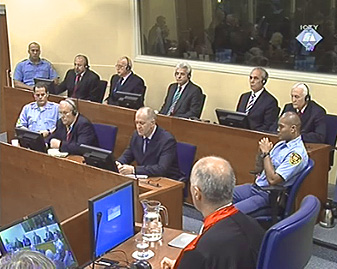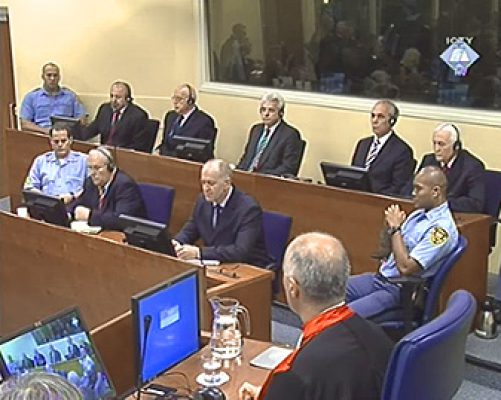
|
Sunniva Hansson has a LL.M., and is a member of the Board of Directors of the Åland Islands Peace Institute
The blog is written by the peace institute’s present or former staff, guest researchers, board members or invited guest writers. The opinions are the author’s own.
|
Today (10 June 2010), the judgment in the so called Srebrenica trial at the International Criminal Tribunal for the former Yugoslavia was rendered. As the colloquial name indicates, the trial concerned the crimes committed in connection with the fall of the Eastern Bosnian enclaves of Srebrenica and Zepa in July 1995. Seven former Bosnian Serb military and police officials stood accused of eight counts of genocide, crimes against humanity and war crimes.
Trial Chamber II of the ICTY found that in July 1995, there had been two joint criminal enterprises (JCE) – one to murder and one to forcibly remove – in which the senior Bosnian Serb military and political establishment participated. The Trial Chamber further found that opportunistic killings were committed as part of both JCEs. The Trial Chamber in Limaj et al explained JCE thus: “When a number of persons are involved in a common plan aimed at the commission of a crime, they can be convicted of participation in a joint criminal enterprise (‘JCE’) in relation to that crime”.
Vujadin Popovic (Chief of Security in the Drina Corps) and Ljubisa Beara (Chief of Security of the Bosnian Serb Army Main Staff) were both found to have participated in the JCE to murder with genocidal intent (i.e. with the aim of destroying the Bosnian Muslim men of Srebrenica) and with persecutory intent. Neither was, however, found to have been a member of the JCE to forcibly remove. Popovic and Beara were sentenced to life imprisonment for genocide, extermination as a crime against humanity, murder as a war crime and persecution as a crime against humanity.
Drago Nikolic (Chief of Security in the Zvornik Brigade of the Drina Corps) was found to have participated in the JCE to murder with persecutory intent. While Nikolic lacked genocidal intent, he had knowledge of the genocidal intent of others and made a substantial contribution to the genocide. He was not found to have been a member of the JCE to forcibly remove. Nikolic was sentenced to 35 years imprisonment for aiding and abetting genocide, extermination, murder and persecution.
Ljubomir Borovcanin, Radivoje Miletic, Milan Gvero and Vinko Pandurevic were also convicted of a number of crimes and sentenced to imprisonment ranging between five and 19 years. It can be noted that in sentencing Pandurevic, the Trial Chamber took into account his decision to defy his superiors and temporarily open a “corridor” from Bosnian Serb territory to Bosnian Muslim territory through which a column of refugees could escape to safety.
Popovic and Beara have therefore become the first two accused to be convicted of genocide at the Tribunal. (Radislav Krstic was previously convicted of genocide pursuant to the lower mode of liability aiding and abetting.)
Today’s judgment concluded the longest trial in the tribunal’s history, lasting from 21 August 2006 until 15 September 2009, during which 315 witnesses were heard.
The summary of the judgment can be found here.
The full judgment has not been published online yet.



